否定的一般疑问句的回答
一般疑问句的肯定回答和否定回答例子
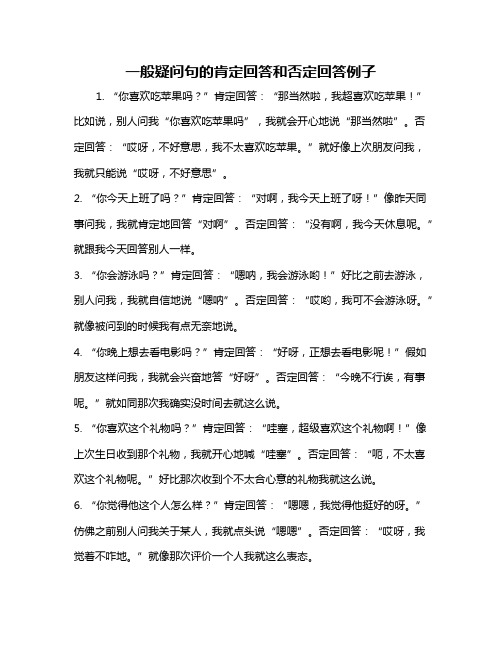
一般疑问句的肯定回答和否定回答例子1. “你喜欢吃苹果吗?”肯定回答:“那当然啦,我超喜欢吃苹果!”比如说,别人问我“你喜欢吃苹果吗”,我就会开心地说“那当然啦”。
否定回答:“哎呀,不好意思,我不太喜欢吃苹果。
”就好像上次朋友问我,我就只能说“哎呀,不好意思”。
2. “你今天上班了吗?”肯定回答:“对啊,我今天上班了呀!”像昨天同事问我,我就肯定地回答“对啊”。
否定回答:“没有啊,我今天休息呢。
”就跟我今天回答别人一样。
3. “你会游泳吗?”肯定回答:“嗯呐,我会游泳哟!”好比之前去游泳,别人问我,我就自信地说“嗯呐”。
否定回答:“哎哟,我可不会游泳呀。
”就像被问到的时候我有点无奈地说。
4. “你晚上想去看电影吗?”肯定回答:“好呀,正想去看电影呢!”假如朋友这样问我,我就会兴奋地答“好呀”。
否定回答:“今晚不行诶,有事呢。
”就如同那次我确实没时间去就这么说。
5. “你喜欢这个礼物吗?”肯定回答:“哇塞,超级喜欢这个礼物啊!”像上次生日收到那个礼物,我就开心地喊“哇塞”。
否定回答:“呃,不太喜欢这个礼物呢。
”好比那次收到个不太合心意的礼物我就这么说。
6. “你觉得他这个人怎么样?”肯定回答:“嗯嗯,我觉得他挺好的呀。
”仿佛之前别人问我关于某人,我就点头说“嗯嗯”。
否定回答:“哎呀,我觉着不咋地。
”就像那次评价一个人我就这么表态。
7. “你能帮我一下吗?”肯定回答:“行啊,没问题,我来帮你!”上次有人这么问我,我就爽快地说“行啊”。
否定回答:“不好意思哈,这会儿没空呢。
”就和那次我有些为难时说的一样。
8. “你养狗了吗?”肯定回答:“养啦,我养了一只超可爱的狗!”就像别人好奇问我时我骄傲地说。
否定回答:“没养呀,还没这个打算呢。
”好像那次我就是这么回应的。
我的观点结论就是:一般疑问句的回答真的很简单直接,有时候一句话就能表达清楚我们的态度和情况呢!。
一般疑问句回答要注意哪四条

一般疑问句回答要注意哪四条一般疑问句有两个家族。
第一家族为含be动词或情态动词的一般疑问句,其结构为:be 动词+ 主语+ 其它部分+?情态动词+ 主语+ 动词原形+ 其它部分+?肯定回答用"Yes,主语+be\情态动词.",否定回答用"No,主语+be\情态动词+not."。
be或情态动词和not可用缩写形式,主要有isn't,aren't,wasn't,weren't,can't,mustn't,needn't等。
Eg.1 问句: Is this your English book?肯定回答: Yes,it is.否定回答: No,it isn't.Eg.2 问句: Are these your English books?肯定回答: Yes,they are.否定回答: No,they aren't.Eg.3 问句: Can you speak English?肯定回答: Yes,I can.否定回答: No,I can't.注意例句1和例句2,在回答时必须将this/that与these/those分别变为it和they。
另一家族为含行为动词(或称为实义动词)的一般疑问句,其结构为:助动词+ 主语+ 动词原形+ 其它+?肯定回答用"Yes, 主语+ do\does.",否定回答用"No, 主语+do\does not."。
助动词也常用缩写形式,主要有don't,doesn't,didn't等。
Eg.4 问句: Do your parents like English?肯答: Yes,they do.否答: No,they don't折叠一般疑问句的回答正如前面所述,回答一般疑问句时有肯定回答和否定回答两种方式,肯定回答以Yes起句,否定回答用No开头。
一般疑问句的肯定和否定回答

含有be动词的一般疑问 句
be动词
否定回答: No + , +代词+ be动词否定形式
not - --n’t
否定形式
缩写
am
is are was were
am not is not are not was not
一般疑问句:Type 1
标志词:be动词
个性:“问什么答什么”
-Is there a library? -Yes, there is.
肯定回答: Yes + , +代词+ be动词
含有be动词的一般疑问 句
肯定回答:Yes + , +代词+ be动词
一、对下列一般疑问句做肯定回答。
1. -Is Bill getting ready for a trip to Canda?
含有情态动词的一般疑问句 肯定回答:Yes + , +代词+ 情态动词
五、对下列一般疑问句做肯定回答。 1. - Should Bill take some scarves to Canada?
. - _Y__e_s___,, ____h__e_ _______should .
2. - Will Bill miss his teachers and friends?
2. -Am I going to Toronto this weekend?
. - __N__o___,, _____y__ou_______ aren’t .
3. -Are they your uncle’s family?
can的一般疑问句用法及回答

can的一般疑问句用法及回答
一般疑问句形式:Can + 主语 + 动词原形?
回答方式:
1. 肯定回答形式:Yes, 主语 + can. / Yes, 主语 + 助动词can.
2. 否定回答形式:No, 主语 + can't. / No, 主语 + 助动词can't.
3. 否定回答时提供额外信息:No, 主语 + can't because + 原因.
例句:
1. Can you swim?(你会游泳吗?)
肯定回答:Yes, I can. / Yes, I can swim.
否定回答:No, I can't.
否定回答时提供额外信息:No, I can't because I haven't learned yet.(不行,因为我还没学会。
)
2. Can they speak Spanish?(他们会说西班牙语吗?)
肯定回答:Yes, they can. / Yes, they can speak Spanish.
否定回答:No, they can't.
否定回答时提供额外信息:No, they can't because they have never learned it.(不行,因为他们从未学过。
一般将来时肯定句,否定句,一般疑问句及其回答的句式

一般将来时肯定句,否定句,一般疑问句及其回答的句式
一般将来时(Simple Future Tense):
●肯定句句式:主语+ will + 动词原形+ 其他。
I will travel to Paris next month.(我下个月将要去巴黎。
)
●否定句句式:主语+ will not (won't) + 动词原形+ 其他。
She won't attend the meeting tomorrow.(她明天不会参加会议。
)
●一般疑问句句式:Will + 主语+ 动词原形+ 其他?
Will you join us for dinner?(你会和我们一起吃晚饭吗?)
●回答:
1.肯定回答:Yes, 主语+ will.
Yes, I will.
2.否定回答:No, 主语+ will not (won't).
No, I won't.
这些句式用于表达将来发生的动作或事件,其中"will" 是助动词,后接动词的原形。
在否定句中,可以使用缩写形式"won't"。
在疑问句中,将"will" 提到主语前。
回答时,可以简单回答肯定或否定。
对一般疑问句的否定回答
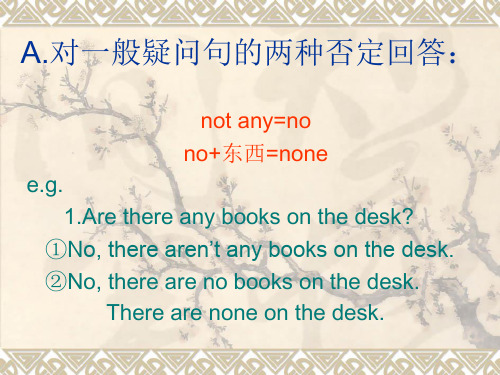
He doesn’t swim every day. She doesn’t swim every day either. Neither do I. He swam yesterday. She swam yesterday, too. So did I. He didn’t swim yesterday. She didn’t swim yesterday either. Neither did I. He will swim. She will swim, too. So will I./ So shall I.
He will not swim. She will not swim either. Neither will I. He has swum. She has swum, too. So have I. He hasn’t swum. She hasn’t swum either. Neither have I.
B.“也”的倒装句:
1.前面说了一个肯定的句子,后面也想表达
同样地意思,在句末加too(too前有逗号) 或用so+助动词+主语! 2.前面说了一个否定的句子,后面也想表达 同样地意思,在句末加either(either前不加 逗号)或用neither+助动词+主语!
He can swim. She can swim, too. So can I. He can’t swim. She can’t swim either. Neither can I. He is swimming. She is swimming, too. So am I. He isn’t swimming. She isn’t swimming either. Neither am I. He swims every day. She swims every day, too. So do I.
一般疑问句
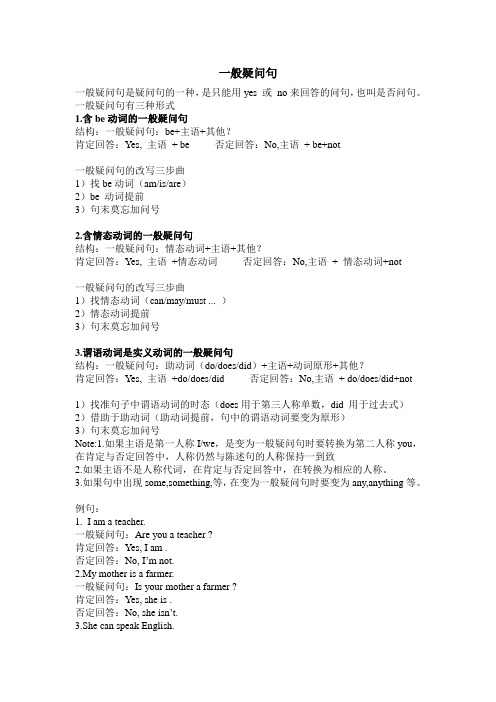
一般疑问句一般疑问句是疑问句的一种,是只能用yes 或no来回答的问句,也叫是否问句。
一般疑问句有三种形式1.含be动词的一般疑问句结构:一般疑问句:be+主语+其他?肯定回答:Yes, 主语+ be 否定回答:No,主语+ be+not一般疑问句的改写三步曲1)找be动词(am/is/are)2)be 动词提前3)句末莫忘加问号2.含情态动词的一般疑问句结构:一般疑问句:情态动词+主语+其他?肯定回答:Yes, 主语+情态动词否定回答:No,主语+ 情态动词+not一般疑问句的改写三步曲1)找情态动词(can/may/must ... )2)情态动词提前3)句末莫忘加问号3.谓语动词是实义动词的一般疑问句结构:一般疑问句:助动词(do/does/did)+主语+动词原形+其他?肯定回答:Yes, 主语+do/does/did 否定回答:No,主语+ do/does/did+not 1)找准句子中谓语动词的时态(does用于第三人称单数,did 用于过去式)2)借助于助动词(助动词提前,句中的谓语动词要变为原形)3)句末莫忘加问号Note:1.如果主语是第一人称I/we,是变为一般疑问句时要转换为第二人称you,在肯定与否定回答中,人称仍然与陈述句的人称保持一到致2.如果主语不是人称代词,在肯定与否定回答中,在转换为相应的人称。
3.如果句中出现some,something,等,在变为一般疑问句时要变为any,anything等。
例句:1. I am a teacher.一般疑问句:Are you a teacher ?肯定回答:Yes, I am .否定回答:No, I’m not.2.My mother is a farmer.一般疑问句:Is your mother a farmer ?肯定回答:Yes, she is .否定回答:No, she isn’t.3.She can speak English.一般疑问句:Can she speak English ?肯定回答:Yes, she can .否定回答:No, she can’t.4.Lily and Lucy can sing.一般疑问句:Can Lily and Lucy sing ?肯定回答:Yes, they can.否定回答:No, they can’t.5.She wants something.一般疑问句:Does she want anything ?肯定回答:Yes, she does .否定回答:No, she doesn’t.6.We did our homework last night.一般疑问句:Did you do your homework last night ? 肯定回答:Yes, we did .否定回答:No, we didn’t.。
一般疑问句
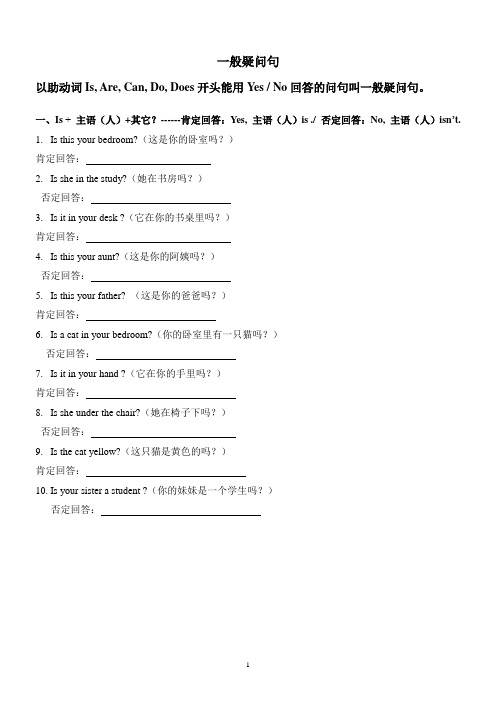
一般疑问句以助动词Is, Are, Can, Do, Does开头能用Yes / No回答的问句叫一般疑问句。
一、Is +主语(人)+其它?------肯定回答:Yes, 主语(人)is ./ 否定回答:No, 主语(人)isn’t.1.Is this your bedroom?(这是你的卧室吗?)肯定回答:2.Is she in the study?(她在书房吗?)否定回答:3.Is it in your desk ?(它在你的书桌里吗?)肯定回答:4.Is this your aunt?(这是你的阿姨吗?)否定回答:5.Is this your father? (这是你的爸爸吗?)肯定回答:6.Is a cat in your bedroom?(你的卧室里有一只猫吗?)否定回答:7.Is it in your hand ?(它在你的手里吗?)肯定回答:8.Is she under the chair?(她在椅子下吗?)否定回答:9.Is the cat yellow?(这只猫是黄色的吗?)肯定回答:10.Is your sister a student ?(你的妹妹是一个学生吗?)否定回答:二、Are + 主语(人)+其它?------肯定回答:Yes, 主语(人)are ./ 否定回答:No, 主语(人)aren’t.1.Are they on the table? (它们在桌子上吗?)肯定回答:2.Are they near the phone?(它个在电话上吗?)否定回答:3.Are they farmers?(他们是农民吗?)肯定回答:4.Are the pencils on the desk?(铅笔在书桌上吗?)否定回答:5.Are you a student?(你是一个学生吗?肯定回答:三、Can+ 主语(人)+其它?------肯定回答:Yes, 主语(人)can. /否定回答:No, 主语(人)can’t.1.Can you spell this words? (你会拼这些单词吗?)肯定回答否定回答:2.Can I have some noodles, please? (请问我能吃一些面条吗?)肯定回答:3.Mom, can I help?(妈妈,我能帮助你吗?)肯定回答:. 否定回答:四、Do + 主语(人)+其它?------肯定回答:Yes, 主语(人)do . /否定回答:No, 主语(人)don’t.1.Do you know?(你认识吗?)肯定:否定2.Do you like them? (你喜欢它们吗?)肯定回答:3.Do you have a computer in it? (你有一台电脑吗?)否定回答:4.Do you like your classroom?(你喜欢你的教室吗?)肯定回答:。
一般疑问句肯定回答

一般疑问句肯定回答【篇一:一般疑问句肯定回答】1、含be动词或情态动词的一般疑问句肯定回答用“yes,主语+be\情态动词.”;否定回答用“no,主语+be\情态动词+not.”;例:(1)问句: are these your english books?肯答: yes,they are.否答:no,they aren’t.(2)问句: can you speak english?肯答: yes,i can.否答:no,i can’t.2、含行为动词(或称为实义动词)的一般疑问句肯定回答用“yes, 主语+ do\does.”;否定回答用“no, 主语+don\does not.”;助动词也常用缩写形式,主要有don’t,doesn’t,didn’t等.例:问句: do your parents like english?肯答: yes,they do.否答:no,they don’t.【篇二:一般疑问句肯定回答】1、含be动词或情态动词的一般疑问句肯定回答用“yes,主语+be\情态动词.”;否定回答用“no,主语+be\情态动词+not.”;be或情态动词和not可用缩写形式,主要有isn’t,aren’t,wasn’t,weren’t,can’t,mustn’t,needn’t等。
例:(1)问句: are these your english books?肯答: yes,they are.否答: no,they aren’t.(2)问句: can you speak english?肯答: yes,i can.否答: no,i can’t.2、含行为动词(或称为实义动词)的一般疑问句肯定回答用“yes, 主语+ do\does.”;否定回答用“no, 主语+don\does not.”;助动词也常用缩写形式,主要有don’t,doesn’t,didn’t等。
例:问句: do your parents like english?肯答: yes,they do.否答: no,they don’t.【篇三:一般疑问句肯定回答】例子:1.iamtenyearsold.areyoutenyearsold?yes,iam.no,imnot.2.theyareplayingfootball.aretheyplayingfootball?yes,theyare.no,theyarent.3.ilikeoranges.doyoulikeoranges?yes,ido.no,idont..thisisgina.isthisgina?yes,sheis.no,sheisnot.2.thatishisbrother.isthathisbrother?yes,heis.no,heisnot.3.heismygoodfriend.ishemygoodfreind?yes,heisno,heist.4.thesearenicepictures.arethesenicepictures?yes,theseare.no,thesearenot.5.thoseareschoolthings.arethoseschoolthings?yes,thoseare.no,thosearenot.。
一般疑问句的回答口诀
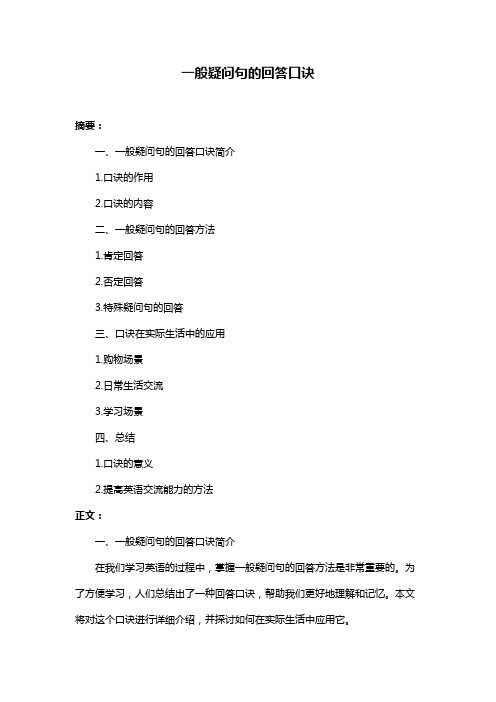
一般疑问句的回答口诀摘要:一、一般疑问句的回答口诀简介1.口诀的作用2.口诀的内容二、一般疑问句的回答方法1.肯定回答2.否定回答3.特殊疑问句的回答三、口诀在实际生活中的应用1.购物场景2.日常生活交流3.学习场景四、总结1.口诀的意义2.提高英语交流能力的方法正文:一、一般疑问句的回答口诀简介在我们学习英语的过程中,掌握一般疑问句的回答方法是非常重要的。
为了方便学习,人们总结出了一种回答口诀,帮助我们更好地理解和记忆。
本文将对这个口诀进行详细介绍,并探讨如何在实际生活中应用它。
二、一般疑问句的回答方法1.肯定回答对于一般疑问句的肯定回答,我们通常需要在句首加上“Yes”,并在末尾加上主格代词“I”或“we”。
例如:- Yes, I am.(是的,我是。
)- Yes, we do.(是的,我们做。
)2.否定回答对于一般疑问句的否定回答,我们通常需要在句首加上“No”,并在末尾加上主格代词“I”或“we”。
例如:- No, I"m not.(不,我不是。
)- No, we don"t.(不,我们不做。
)3.特殊疑问句的回答特殊疑问句的回答通常需要用到疑问词,如:who, what, when, where, why 等。
回答时,需要将这些疑问词与“is/are”、“do”、“did”等助动词搭配使用。
例如:- Who is he?(他是谁?)- He is my friend.(他是我的朋友。
)- What did you do?(你做了什么?)- I played football.(我踢了足球。
)三、口诀在实际生活中的应用1.购物场景在购物时,我们经常会遇到需要用英语交流的情况。
掌握一般疑问句的回答口诀,可以帮助我们更自信地进行沟通。
例如:- Cash or credit card?(现金还是信用卡?)- Cash.(现金。
)- Do you need a bag?(需要袋子吗?)- Yes, please.(是的,谢谢。
一般疑问句的肯定否定回答

亠般疑问句的肯定否定回答—、注意事项1、人称的变化:l/we/me/us —you , my/our —your;2、借助代词;3、否定缩写形式:be动词+not (is not =isn ',are not=aren ',was not =wasn ',were not =weren ')情态动词+not(can not =can', could not =couldn ', should not =shouldn ', must not=mustn')助动词+not (do not=don', does not=doesn', did not=didn ');4、区分be动词、情态动词和实义动词的不同情况。
二、例题讲解1、M r.Green is an English teacher.(改成一般疑问句并做肯定、否定回答回答)Is Mr.Green an English teacher? Yes, he is./No,he isn't.(有be动词的,把be动词提前放句首,答句要用代词he 替换掉Mr.Green。
)2、M y uncle can teach me Chinese.(改成一般疑问句并做肯定、否定回答)Can your uncle teach you Chinese? Yes, he can./ No, he can'. (有情态动词的,把情态动词提前放句首,答句要用代词he 替换掉your uncle。
)3、W e have a lot of books.(改成一般疑问句并做肯定、否定回答)Do you have a lot of books? Yes, we do/No, we don '.(有实义动词的,引入助动词,人称要变化)三、巩固练习1、My school has one hundred teachers.(改成一般疑问句并做肯定回答)2、They are factory workers.(改成一般疑问句并做否定回答)____________________________________ ?,・3、The restaurant has three new cooks.(改成一般疑问句并做肯定回答)____________________________________ ?,・4、Miss Li often writes stories at home.(改成一般疑问句并做肯定回答)____________________________________ ?,・5、I can go to school by bus.(改成一般疑问句并做否定回答)6、She works on the farm.(改成一般疑问句并做肯定回答),・7、Su hai'father could play many kinds of games.(改成般疑问句并做肯定回答)8、My aunt is a nurse in a hospital.(改成一般疑问句并做否定回答)9、That man is a driver.(改成一般疑问句并做否定回答)10、There are some birds in the tree.(改成一般疑问句并做肯定回答)11、There is some milk on the table.(改成一般疑问句并做否定回答)12、Jack'mother often makes nice sweets for us.(改成一般疑问句并做肯定回答)13、The old man always helps sick people. (改成一般疑问句并做肯定回答)14、My brother can cook nice food.(改成般疑问句并做否定回答)?,・15、She'the best writer in America. (改成一般疑问句并做肯定回答)?,・16、My sister likes skating very much. (改成一般疑问句并做肯定回答)?,・17、He s a student at Sunshine Primary school.(改成一般疑问句并做否定回答)?,・18、I love my father and mother.(改成般疑问句并做肯定回答)?,・19、They work at the same hospital. (改成一般疑问句并做否定回答)?20、David had a cold last week.(改成一般疑问句并做否定回答),・21、I did my homework yesterday.(改成一般疑问句并做否定回答)?,・a year ago.(改成一般22、Her parents worked in Nanjing疑问句并做肯疋回答)?。
否定、一般疑问句练习 am is are was were
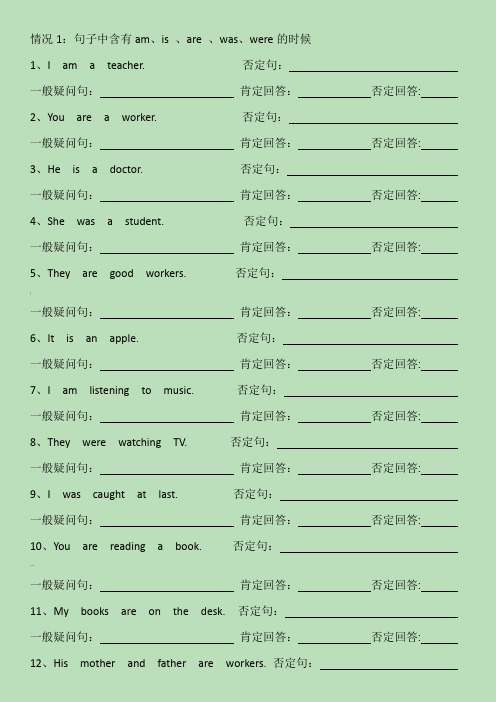
情况1:句子中含有am、is 、are 、was、were的时候1、I am a teacher. 否定句:一般疑问句:肯定回答:否定回答: 2、You are a worker. 否定句:一般疑问句:肯定回答:否定回答: 3、He is a doctor. 否定句:一般疑问句:肯定回答:否定回答: 4、She was a student. 否定句:一般疑问句:肯定回答:否定回答: 5、They are good workers. 否定句:;一般疑问句:肯定回答:否定回答: 6、It is an apple. 否定句:一般疑问句:肯定回答:否定回答: 7、I am listening to music. 否定句:一般疑问句:肯定回答:否定回答: 8、They were watching TV. 否定句:一般疑问句:肯定回答:否定回答: 9、I was caught at last. 否定句:一般疑问句:肯定回答:否定回答: 10、You are reading a book. 否定句:…一般疑问句:肯定回答:否定回答: 11、My books are on the desk. 否定句:一般疑问句:肯定回答:否定回答: 12、His mother and father are workers. 否定句:一般疑问句:肯定回答:否定回答:先变成否定句再变成一般疑问句,并作出肯定和否定回答。
1、She is going to do her homework.2、I am in Row 1.3、The red car is mine.4、Two pens are on the desk.5、The pen is red.6、His father is an English teacher.7、$8、He is crying under the tree. 8、This is a book.9、They are footballs. 10、I am sleeping.11、I am from China. 12、They are in the bedroom.13、I am in the park. 14、I am ten years old.15、I was writing my homework. 16、I was at home.17、She was twelve last year. 18、He is over there.19、My mother is going to Beijing. 20、The flower is very beautiful.先变成否定句再变成一般疑问句,并作出肯定和否定回答。
否定形式的一般疑问句的回答
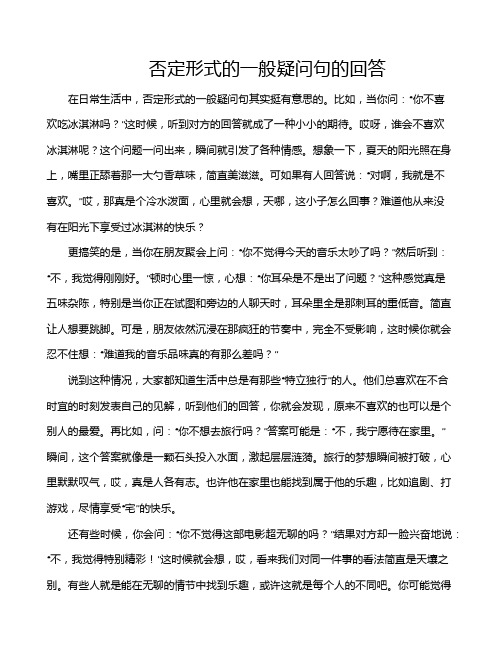
否定形式的一般疑问句的回答在日常生活中,否定形式的一般疑问句其实挺有意思的。
比如,当你问:“你不喜欢吃冰淇淋吗?”这时候,听到对方的回答就成了一种小小的期待。
哎呀,谁会不喜欢冰淇淋呢?这个问题一问出来,瞬间就引发了各种情感。
想象一下,夏天的阳光照在身上,嘴里正舔着那一大勺香草味,简直美滋滋。
可如果有人回答说:“对啊,我就是不喜欢。
”哎,那真是个冷水泼面,心里就会想,天哪,这小子怎么回事?难道他从来没有在阳光下享受过冰淇淋的快乐?更搞笑的是,当你在朋友聚会上问:“你不觉得今天的音乐太吵了吗?”然后听到:“不,我觉得刚刚好。
”顿时心里一惊,心想:“你耳朵是不是出了问题?”这种感觉真是五味杂陈,特别是当你正在试图和旁边的人聊天时,耳朵里全是那刺耳的重低音。
简直让人想要跳脚。
可是,朋友依然沉浸在那疯狂的节奏中,完全不受影响,这时候你就会忍不住想:“难道我的音乐品味真的有那么差吗?”说到这种情况,大家都知道生活中总是有那些“特立独行”的人。
他们总喜欢在不合时宜的时刻发表自己的见解,听到他们的回答,你就会发现,原来不喜欢的也可以是个别人的最爱。
再比如,问:“你不想去旅行吗?”答案可能是:“不,我宁愿待在家里。
”瞬间,这个答案就像是一颗石头投入水面,激起层层涟漪。
旅行的梦想瞬间被打破,心里默默叹气,哎,真是人各有志。
也许他在家里也能找到属于他的乐趣,比如追剧、打游戏,尽情享受“宅”的快乐。
还有些时候,你会问:“你不觉得这部电影超无聊的吗?”结果对方却一脸兴奋地说:“不,我觉得特别精彩!”这时候就会想,哎,看来我们对同一件事的看法简直是天壤之别。
有些人就是能在无聊的情节中找到乐趣,或许这就是每个人的不同吧。
你可能觉得剧情拖沓,他却觉得每一个细节都充满了深意。
这种时候,简直就是电影圈里的“咸鱼翻身”,完全不在一个频道上,惹得你只好默默翻白眼,心中想:“咱俩真是两个世界的人。
”如果说生活是个大舞台,那每个人都是自己的主演。
would一般疑问句用法及回答

would一般疑问句用法及回答摘要:一、would 的一般疑问句用法1.构成:Would + 动词原形+ 其他成分2.疑问词:Would + 主语+ 动词原形+ 其他成分3.回答:肯定回答:Yes, 主语would.否定回答:No, 主语would not.二、would 的否定疑问句用法1.构成:Would + 主语+ not + 动词原形+ 其他成分2.疑问词:Would + 主语+ not + 动词原形+ 其他成分3.回答:肯定回答:Yes, 主语would not.否定回答:No, 主语would. 正文:would 一般疑问句用法及回答在英语中,would 常用来表示一种对将来的假设或者请求。
它的一般疑问句用法可以帮助我们询问别人是否愿意做某事。
而would 的否定疑问句则用来询问别人是否不愿意做某事。
接下来我们将详细介绍这两种疑问句的构成、疑问词以及回答方式。
一、would 的一般疑问句用法1.构成:Would + 动词原形+ 其他成分。
例如:Would you like some tea?(你想喝点茶吗?)Would he come to the party?(他会来参加聚会吗?)2.疑问词:Would + 主语+ 动词原形+ 其他成分。
例如:Would you like to go to the movies?(你想去看电影吗?)Would he be able to help me?(他能帮我吗?)3.回答:肯定回答:Yes, 主语would.否定回答:No, 主语would not.例如:- Would you like some tea?- Yes, I would.(是的,我想要喝点茶。
)- No, I would not.(不,我不想喝。
)二、would 的否定疑问句用法1.构成:Would + 主语+ not + 动词原形+ 其他成分。
例如:Would you not like some tea?(你不想喝点茶吗?)Would he not come to the party?(他不会来参加聚会吗?)2.疑问词:Would + 主语+ not + 动词原形+ 其他成分。
- 1、下载文档前请自行甄别文档内容的完整性,平台不提供额外的编辑、内容补充、找答案等附加服务。
- 2、"仅部分预览"的文档,不可在线预览部分如存在完整性等问题,可反馈申请退款(可完整预览的文档不适用该条件!)。
- 3、如文档侵犯您的权益,请联系客服反馈,我们会尽快为您处理(人工客服工作时间:9:00-18:30)。
否定的一般疑问句的回答
中文习惯先对以上问句肯否作出判断再回答事实但在英文中不要对以上的问句肯否作出判断直接回事
实yes or no是或不是但在翻译时要根据中文习惯对以上肯否作判断所以就形成了一个差异但翻译是
给中国人听的所以要把英文中的yes翻译成否no翻译成是总之记住三点一据实回答二前肯后肯前否
后否三no与yes的翻译附否定疑问句和一般疑问句回答相同列are you a student?yes i am arent
you a student?yes i am.
【篇二:否定的一般疑问句的回答】
1、含be动词或情态动词的一般疑问句
肯定回答用“yes,主语+be\情态动词.”;
否定回答用“no,主语+be\情态动词+not.”;
be或情态动词和not可用缩写形式,主要有isn’t,aren’t,wasn’t,weren’t,can’t,mustn’t,needn’t等。
例:(1)问句: are these your english books?
肯答: yes,they are.
否答: no,they aren’t.
(2)问句: can you speak english?
肯答: yes,i can.
否答: no,i can’t.
2、含行为动词(或称为实义动词)的一般疑问句
肯定回答用“yes, 主语+ do\does.”;
否定回答用“no, 主语+don\does not.”;
助动词也常用缩写形式,主要有don’t,doesn’t,didn’t等。
例:问句: do your parents like english?
肯答: yes,they do.。
